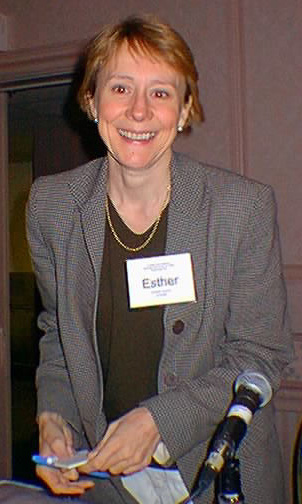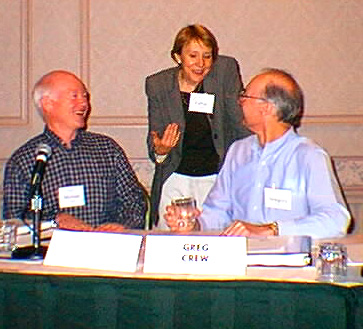Update:
On Nov. 25, 1998, the United States Department of Commerce and the Board of
ICANN signed a memorandum of understanding that allows ICANN to proceed to develop
the new procedures and policies necessary for an orderly transfer, over time,
of responsibility for the Internet root servers and domain name and number management
to ICANN. See the memorandum of understanding here.
Road Trip (photos below)
I was fortunate
enough to be able to attend the coming-out "party" on Nov. 14 for
ICANN, the Internet Corporation for Assigned
Names and Numbers. Why did I go?
- I hadn't been to Boston
in a long time.
- Nicole was going off
to New Hampshire with her baby-eating friends from alt.support.childfree,
anyway.
- I care about the Internet
and how it works.
- And frankly ... I
wanted to watch Esther Dyson herd cats.
What is it all about? Declan
McCullagh of Wired covered the event here;
News.com has a respectable take on the events of the day here.
For those interested in a more complete picture, ICANN and the Berkman Center
for Internet & Society at the Harvard Law School have provided comprehensive
summaries, transcripts, and full streamed audio and video of the events of the
day.
For now, it's about the
difficult and uncertain birth of an organization that could wield enormous
power on the Internet -- a new international, non-profit organization that
will make decisions regarding the management and assignation of names and
numbers to devices on the Internet that need them to talk to each other. This
has been controversial since the Internet started getting big. Domain names
-- from microsoft.com right on down
to teeny-tiny Tales from the Bitstream --
are part identity, part commodity and wholly controversial. There are now
more than 100 million computers in the world that either have an assigned
number, both an assigned number and a name or could have a dynamic number on the
Internet at any given time. That the system has worked as well as it has is
largely a tribute to the work of one man, Dr. John Postel, the recently deceased
director of the Internet Assigned Numbers Authority.
The board faces an almost
breathtaking array of problems, many of which I only started considering yesterday,
Nov. 14. I suspect that board members only started considering some of the
issues in all their complexity when confronted by the skeptical crowd, looking
for some answers.
After the all-day affair,
I joined a dinner posse composed, in part, of people with far more technical
knowledge than I have of the way the Internet works -- and listened to a dissection
of the board, its opponents, the process up to now and the process as it might
evolve. And we got into some worst-case scenarios that would curl the hair
of the most casual web surfer.
And therein lies the key
question, for now -- one that was raised in a myriad of ways at the public
meeting. Does the Internet community trust this board to do the right things,
to make wise decisions for the common good?
It is too big a process
to say with any confidence that the board will "succeed." In fact,
there are as yet no criteria by which to judge success.
As a single member of
the Internet community, I choose to trust them not to fail, which is another
proposition entirely. I do not believe they will make uncorrectable
mistakes.
Let them go forward.
|

|
Herding Cats? |
|
Left, Esther
Dyson, Interim Chairman of ICANN, just before the public meeting.
Below, she chats with Michael Roberts, Interim President and CEO
(left) and Greg Crew of Australia during a break in the action.

|
|
"How many
think this is an out-and-out fraud and are here to stop it?"
--
Esther Dyson
|
Additional pictures, click here ...

